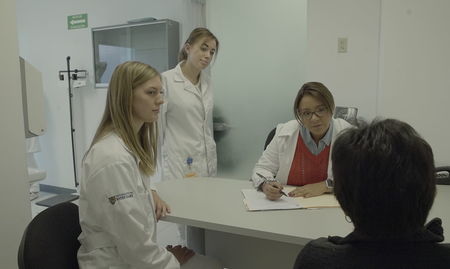Physical Address
We usually recommend students take the MCAT in their junior year, even in the fall semester if possible. This is based on the assumption that the student wishes to matriculate directly after graduation and not take a gap year. Furthermore, taking the MCAT within this timeframe allows for a retake before you apply just in case you’re not happy with your first result.
How to Succeed as a University of Notre Dame Premed
Everything you need to know about premed at the University of Notre Dame, including premed requirements, the best extracurriculars, and the University of Notre Dame premed acceptance rate

Part 1: Introduction
Part 2: University of Notre Dame premed requirements
Part 3: University of Notre Dame premed extracurriculars
Part 4: Getting into medical school as a University of Notre Dame premed
Part 1: Introduction
As one of the top institutions of higher learning in the nation, the University of Notre Dame embodies a remarkable blend of faith-based and secular education. No stranger to scientific inquiry, research at Notre Dame has directly impacted breakthroughs such as the formulae of synthetic rubber and wireless communication. They continue to push ahead in the 21st century actively investigating tropical diseases, cancer, and nanoelectronics.
Yet the Catholic philosophy of its founder, Rev. Edward Sorin, still informs much of what they do. This unique approach to education has earned it a top spot among U.S. undergraduate institutions and produced many notable alumni—among them Regis Philbin, Nicholas Sparks, and Condoleeza Rice.
While media or politics may not be your ultimate goal as a premed, Notre Dame is well-known for sending many of its graduates to excellent medical schools across the nation. In 2022, it supplied a total of 298 applicants to medical school; only 10 schools in the nation provided more. With so many applicants coming through Notre Dame’s programs, there must be wide-ranging and robust support to get them through the application process.
In this guide, we’ll take a close look into exactly what it takes to add your name to the list of successful Notre Dame premeds and break down step-by-step what you’ll need to do to get there. We’ll detail all the premed requirements you’ll need to complete, discuss which extracurriculars are likely to help you stand out (and how to find them)—including volunteering, clinical, and shadowing opportunities. Finally, we’ll analyze the University of Notre Dame premed acceptance rate.
Part 2: University of Notre Dame premed requirements
No matter where you go for undergrad, if you’re planning to continue to medical school, you’ll have certain requirements to meet to even be considered for a spot. Each medical school has its own list of courses they want you to have taken, but typically, they boil down to a host of STEM and humanities classes.
As a University of Notre Dame premed, you’ll have a variety of options for how you choose to satisfy these requirements. Although UND is known for its liberal arts programs, you’ll have no problem ticking off the boxes for your science courses. In fact, unlike most colleges, the University of Notre Dame has a pre-health supplemental major in the College of Arts and Sciences and a robust advising office to make your journey from freshman to medical school acceptee as smooth as possible. Keep in mind that any major at UND can apply to med school; by no means are you required to follow the pre-health supplemental major path.
To succeed, you’ll need to work out an actionable plan for your particular circumstances. Every student enters college with varying levels of knowledge about certain subjects and this can have a bearing on when you take certain courses as well as how much work they will entail for you. For example, perhaps you took AP Biology courses in high school, so while you’ll still need to take the same biology courses as every other premed at UND, the introductory courses may be easier for you to handle. This could leave you with more time to get other prerequisites out of the way, such as Math, English, or Sociology before you have to tackle more difficult courses like biochemistry while juggling extracurriculars and volunteering.
Whatever your situation, we’ve broken down exactly what you’ll need to do by listing the required courses for all premeds at UND in the table below.
| University of Notre Dame Premed Requirements | ||||||
| Medical school requirement | Required courses | Optional courses | ||||
| Biology: Two semesters (with lab) | BIOS 10171 & Lab BIOS 10172 & Lab |
Three relevant upper-level natural science electives at the 30000 or 40000 level are required. | ||||
UND strongly recommends Vertebrate Physiology (BIOS 30344)
CHEM 10171 (includes lab and tutorial)
CHEM 10172 (includes lab and tutorial)
Organic Chemistry
CHEM 20273 & Lab
CHEM 20274 & Lab
As you can see, you’ll have a lot on your plate as a UND premed. Figuring out how to manage your time while planning appropriately for graduation and med school applications will take some effort and should be done in conversation with your advisor.
However, we can map out a possible path to give you an idea of how you might chart your course through your undergraduate years. To do this, we’ve created a table below showing how you can satisfy the prerequisites for medical school at the University of Notre Dame. This table assumes that you don’t plan to take a gap year and that you wish to take the MCAT during your junior year.
| Sample University of Notre Dame Three-Year Course Plan | ||||||
| Semester | Courses | |||||
| Freshman Fall | Writing and Rhetoric 13100 CHEM 10171 Calculus A MATH 10350 |
|||||
| Freshman Spring | Community Based Writing and Rhetoric 13200 Calculus B MATH 10360 CHEM 10172 |
|||||
| Freshman Summer | Introduction to Sociology 10002 | |||||
| Sophomore Fall | BIOS 10171 & Lab CHEM 20273 & Lab Elements of Statistics 17059 |
|||||
| Sophomore Spring | BIOS 10172 & Lab CHEM 20274 & Lab |
|||||
| Sophomore Summer | PSY 10000 Introductory Psychology | |||||
How to maintain a high GPA as a University of Notre Dame premed
As a student at a storied university whose alumni routinely go on to do great things, you will have your work cut out for you to keep your GPA up. The Notre Dame name carries a lot of weight for good reason. Its reputation for scholarly rigor and academic excellence stretches far and wide.
In an environment such as this, balancing your premed requirements along with your major is a daunting task for even the brightest premeds. Nevertheless, this balancing act must be deftly handled to have a chance at achieving your ultimate goal—entry into medical school. Remember that one of the first things adcoms see about you is your GPA.
That said, it’s entirely possible to navigate the GPA gauntlet and come out with stellar grades. We’ve listed a few top tips that we’ve gathered from helping students over the years for keeping your GPA up while at UND.
- Plan early and thoroughly. It can’t be stressed enough that having a solid plan coupled with follow-through is a surefire avenue to success. Map out a plan for your classes early on and stick with it. Gather as much information as you can about course options and the workload. You can do this by working closely with the academic advising office. Additionally, checking what other students have said about a course on the UND Reddit forum can help.
- Seek help when you need it. Even the best students struggle sometimes with a difficult subject. While focused study is important, if something is just not clicking, there’s no need to suffer in silence and hope for the best come test day. UND’s Learning Resource Center offers small group, drop-in, and even one-on-one tutoring sessions in a variety of subjects completely free. This is geared towards help with first-year courses, so if you’re looking for help with a more advanced course or skill, be sure to look on ATLAS (Academic Tutoring Landscape for Advising Students) where you’ll find assistance with writing, reading, math, languages, and more.
- Spread out your commitments. Cramming a full course load including premed requirements into two semesters per year can be tough. To mitigate the heavy workload and to avoid spreading yourself too thin, explore options for summer courses. This is often a great way to knock out those prerequisites and give them your full attention to ensure you walk away with an A.
- Familiarize yourself with new material beforehand. Have you ever considered pre-studying? There are a plethora of free or affordable online courses these days on sites such as Khan Academy or Udemy that do an excellent job of giving you a good idea of what to expect in your college course. If you’re a bit anxious about that upcoming biochemistry class, why not start to wrap your head around the fundamentals early?
What is the best University of Notre Dame premed major?
Those with dreams of med school matriculation often ask us what they think is a simple question, “Which major is best for medical school?” What they really mean, though, is “Which premed major has the highest acceptance rate?” This is viewed as a way to hack the system and if they can eke out even just a few percentage points of advantage over their peers, it’s well worth the effort.
Unfortunately, there is no cut and dry answer to this question. The truth is, med school adcoms view applications holistically and don’t rank students by their major. While it’s true that many premeds major in the sciences, this doesn’t translate into a higher acceptance rate at med schools. Adcoms are looking for aptitude and passion about a subject, so keeping your GPA up will help you more in the long run. At UND, you have just as much of a chance of getting into med school by majoring in Romance Languages as you do majoring in Civil Engineering.
When should you take the MCAT?
As you traverse your premed journey at UND, you’ll naturally begin to think about that all-important test for medical school admission, the MCAT. One of the most common considerations UND premeds have is the optimal time to sit the exam. You’ll want to ensure you have taken all the necessary courses to build the foundational knowledge required to obtain your highest score possible, but this can be tricky due to class scheduling issues, not wanting to overload yourself with coursework, or simply your plans for the future shifting—such as wanting to participate in a study abroad program.
We usually recommend students take the MCAT in their junior year, even in the fall semester if possible. This is based on the assumption that the student wishes to matriculate directly after graduation and not take a gap year. Furthermore, taking the MCAT within this timeframe allows for a retake before you apply just in case you’re not happy with your first result.
Premeds at the University of Notre Dame are encouraged to engage in study abroad programs, so it’s important to keep this in mind when planning your final years as an undergraduate. They recommend studying abroad in the fall of your junior year and taking the MCAT in the spring, but ultimately, this is up to personal preference and your own individual circumstances.
The Major
Why prepare for medical school through Arts and Letters?

The process of getting into medical school—and the type of student medical schools are looking to recruit—has evolved rapidly. The Medical College Admissions Test (MCAT) has increased its focus on social sciences, such as psychology and sociology. Medical schools are now increasingly seeking applicants with a broad, liberal arts education who have developed the interpersonal skills necessary for a successful career in medicine.
Regardless of major, 84% of Notre Dame pre-med graduates are admitted to medical school—that’s twice the national average. As an Arts and Letters pre-health supplementary major, you can pursue any major in the College while acquiring the education, skills, and experience you need to get into—and succeed in—graduate school for medicine and other health professions.
Center for Career Development reports show that Arts and Letters pre-health students from majors as diverse as anthropology, classics, English, French, history, psychology, sociology, Spanish, studio art, and theology went on to medical school at Brown University, Emory University, George Washington University, Loyola University, Michigan State University, the University of Illinois, the University of Iowa, the University of Texas, and many others, as well as optometry, dental, physical therapy, nursing, and public health programs.
How will it prepare you?
The Arts and Letters pre-health program combines at least 49 hours of science in conjunction with more than 70 hours of classes in humanities, social sciences, and the arts. These courses will help prepare you for the new MCAT, which includes sections on behavioral and social sciences and critical analysis and reasoning.
Core science coursework, also necessary preparation for the MCAT, comprises 40 hours of the supplementary major; the other 9 hours are made of upper-level science electives. Students can select electives to meet the requirements for any of the health professions graduate schools, such as medical, dental, veterinary, physical therapy, physician assistant, nursing, or optometry school.

In no way does a background in the humanities mean you can’t be successful in the medical field. In fact, I think the analytical, critical thinking, and communications skills I picked up as an English major really enhanced my ability to work across disciplines.
-Jeff Miller ’89, M.D. and professor at Penn State University’s Milton S. Hershey Medical Center









